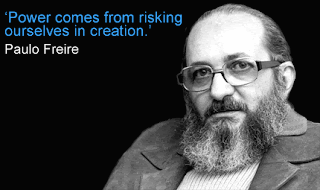 In my lucky situation teaching at "The People's University" at Portland State, I get to meet and have collegial conversations with my intellectual betters and with amazing scholars from all over the world. Yesterday, I talked with Veronica Dujon, originally from St Lucia, probably the most popular professor amongst the 1,500 or so employed in our downtown institution. We both advise graduate students and she said she always asks, when reviewing a research proposal, "What good will it do?" She said she needs to see hope of utilization toward a better world for all or she cannot approve the proposal. That seems like a great benchmark and can certainly start the student thinking beyond the academy, which, we hope, is the point.
In my lucky situation teaching at "The People's University" at Portland State, I get to meet and have collegial conversations with my intellectual betters and with amazing scholars from all over the world. Yesterday, I talked with Veronica Dujon, originally from St Lucia, probably the most popular professor amongst the 1,500 or so employed in our downtown institution. We both advise graduate students and she said she always asks, when reviewing a research proposal, "What good will it do?" She said she needs to see hope of utilization toward a better world for all or she cannot approve the proposal. That seems like a great benchmark and can certainly start the student thinking beyond the academy, which, we hope, is the point.
Brian Martin (2005), nonviolence researcher, noted, "Nonviolence research has often served to inspire and inform researchers and activists but rarely has had an impact on policy" (p. 247). The dialectic between research and activism is what Paulo Freire called praxis, but how do we get that translated into policy?

This is our challenge, of course, and, as we all know about the Law of Unintended Consequences, we need to be careful of what we wish for. Perhaps a little of our research translated into policy is sometimes worse than none, such as when psychologists and anthropologists (and possibly conflict resolution researchers) find their work used to further or protect empire rather than what we intend.
We try to be mindful and perhaps the most meaningful policy change is ultimately the dissolution of the United States of America into regionally sovereign nations that don't own nuclear weapons or planetary military power projection infrastructures. But there is also our own personal policy world, isn't there? The research itself may just be a tool for anyone to use, but even the researchers need to be players out beyond the walls of the academy if we are going to effect positive peace public policy.
References
Martin, Brian (2005). Researching nonviolent action: past
themes and future possibilities. Peace & Change, 30(2) 247-270.



No comments:
Post a Comment